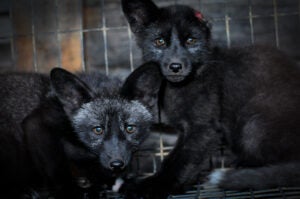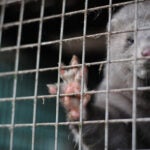
BRUSSELS—Animal protection group Humane Society International/Europe has called “inexcusable” the European Commission’s failure today to recommend an EU-wide fur farming ban in response to the 1.5 million signature-strong European Citizens’ Initiative petition. Despite overwhelming evidence that animal suffering is endemic within fur farming, the European Commission failed to urgently end the suffering of 10 million foxes, raccoon dogs, mink and chinchillas killed on EU fur farms each year and instead delayed until 2026 any decision on proposing a ban. HSI/Europe says that the Commission’s failure to deliver a ban condemns millions of sentient animals to lives not worth living on the EU’s remaining fur farms.
The Commission’s Communication states the European Food Safety Authority will provide its scientific opinion on the welfare of animals on fur farms by March 2025, followed by an evaluation which the Commission pledged to present by March 2026 to say whether they will deliver an EU-wide ban on fur farming and on the sale of fur taken from mink, foxes, raccoon dogs, and chinchillas. Given that the mandate of the current Commission is due to end in late 2024, there is no guarantee that their successors will make good on this promise.
Dr Joanna Swabe, senior director of public affairs for Humane Society International/Europe, noted: “The plans announced today show a European Commission that is out of touch with public opinion and expectations for stronger laws to stop animals suffering. Millions of European citizens recognise that keeping huge numbers of wild animals on fur factory farms is grossly inhumane, and leading virologists warn that fur farms present a very real pandemic disease risk. So, it is deeply frustrating and worrying that the Commission is side-stepping its responsibility for decisive action to end the outdated and unnecessary fur trade. Irrespective of fur industry claims about welfare, each and every fur farm investigation in recent times consistently shows chronically stressed animals living under appalling conditions. Stereotypical behaviours, self-mutilation, untreated wounds and even cannibalism are tragically common horrors on European fur farms. The Commission’s failure to deliver a ban today is inexcusable and condemns millions of sentient animals to lives not worth living on the EU’s remaining fur farms.”
The announcement about the Fur Free Europe ECI was made alongside the publication of the Commission’s highly watered-down Animal Welfare Package. The only proposals that the Commission has delivered today are to revise Regulation (EC) No 1/2005 on the protection of animals during transport and related operations, and a new Regulation on the welfare of dogs and cats and their traceability. Alone, these proposals fall short of the commitments made in the Farm to Fork Strategy and the Commission’s promise to the 1.4 million European citizens backing the ‘End the Cage Age’ European Citizen’s Initiative
Ruud Tombrock, executive director of HSI/Europe, commented: “While the proposal on animal transport contains some progressive elements, it ignores EFSA’s scientific recommendations about making sure no animal is transported in frigidtemperatures below 5°C and suffocating heat exceeding30°C. Derogations would still allow vulnerable and young animals, such as calves not yet weaned from their mother’s milk to be transported for long durations byroad. Absurdly, when these unweaned animals are transported by sea, as it often happens with calves exported from Ireland to mainland Europe, the time travelled by sea does not count as journey time. There is also no ban on live exports to non-EU countries, which has been long demanded by animal protection NGOs. The failure to address these issues is evidence that industry interests have prevailed over science and ethics, and that despite this legislative revision, it will be business as usual for operators to the detriment of animal welfare. Member States and Members of the European Parliament during the next political term must commit to strengthening this proposal to give animals the protection that they deserve.”
Facts on fur farming
- The Commission’s communication on the Fur Free Europe ECI acknowledges that fur farming poses a risk to public health and that it is relevant to the EU’s One Health policy of protecting animals, humans and the environment. To these ends, it commits to conducting three on-site visits to fur farms to assess the disease control mechanisms in place, as well as looking into animal welfare on the selected farms.
- The risk to native biodiversity posed by fur farms is also addressed in the Communication. While raccoon dogs are already listed on the list of invasive alien species of Union concern, the Commission states that in 2024 it will consider whether to propose to include American mink in this list. Previous attempts to do so had been blocked by several Member States despite the responsible scientific committee’s approval of a risk assessment highlighting the threat American mink pose to native biodiversity.
- Fur farming has already been completely banned in 15 Member States (with phase-outs still ongoing in some), namely Austria, Belgium, Croatia, Czech Republic, Estonia, France, Ireland, Italy, Latvia, Lithuania, Luxembourg, Malta, the Netherlands, Slovenia and Slovakia. Partial bans have also been introduced in other Member States, namely Denmark, Sweden and Hungary. Legislation in Germany has rendered fur farming economically unviable. A proposal to ban fur farming is currently under consideration in Romania.
Facts on improving lives of animals farmed for food:
- In 2020, the Commission committed to revising and expanding the scope of the existing EU animal welfare legislation in the framework of the EU Farm to Fork Strategy. Following the 1.4 million signatures strong ECI to End the Cage Age, the Commission later pledged to deliver a legislative proposal to end caged confinement for animals farmed for food by the end of 2023. This proposal has not been forthcoming.
- The Commission’s proposal to revise the existing animal transport legislation includes the following elements:
- Proposing the lowering of maximum journey times for most species. For example, horses, cows, sheep, goats and pigs should not be transported to slaughter for more than nine hours.
- Updating space allowances to be aligned with EFSA’s recommendations on animal transport
- Protecting young unweaned calves, lambs, kids, piglets and foals by banning on-road transportation over eight hours. However, a very concerning loophole exists where if part of the animal transportation occurs at sea, the time spent at sea is not included in the overall journey duration, thereby undermining the protection of unweaned animals.
- Requiring real-time traceability of live animal consignments for all road journeys, which will help enforce rules designed to protect animals, such as maximum transportation times.
- Limiting live animal transport to ships flying white or grey flags. Under the performance ratings of the Paris Memorandum of Understanding on Port State Controls, only those ships will be allowed to operate and receive authorisation certificates to transport live animals. This will exclude ships that have shown an excessive number of deficiencies to be responsible for transporting animals.
ENDS
Media contact: Cassie Bodin-Duval, international media relations coordinator; cbodinduval@hsi.org



